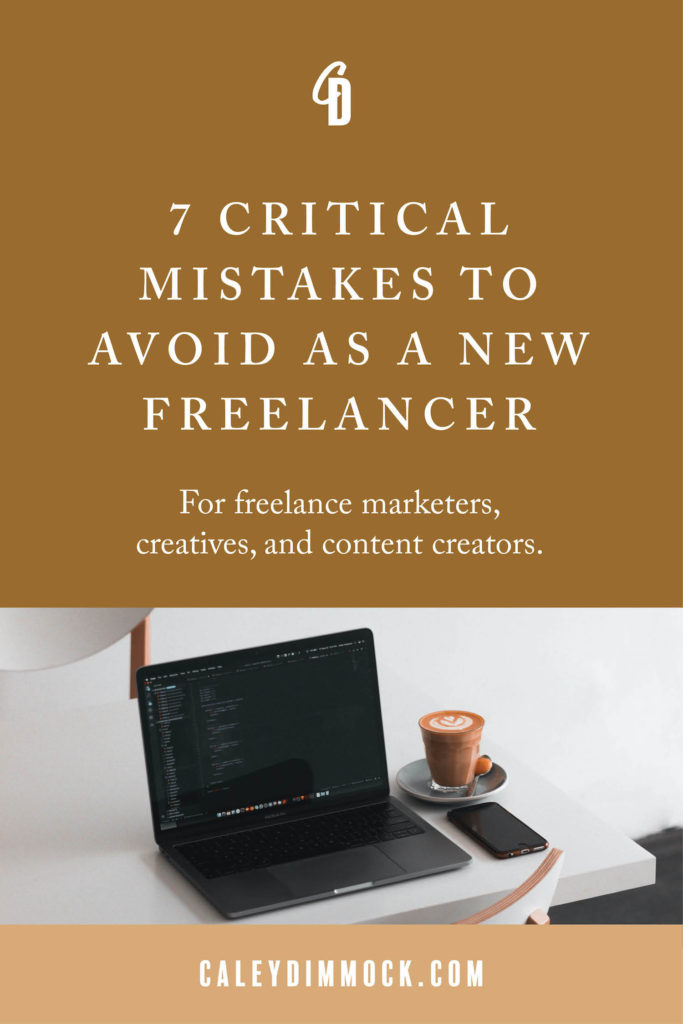If you’ve worked for someone else your entire life, venturing into the world of freelancing can be quite scary. It’s a whole new ball game and there is SO much to learn.
When I took the plunge to work for myself full-time in 2017, I felt like I was floundering. I had so many questions, a lack of guidance, and I really wished I had someone to hold my hand through the whole thing.
Did I make some mistakes? Oh, heck yeah.
Did I learn from them? Oh, heck yeah.
Am I now going to share a round-up of the top mistakes I made and some I’ve seen others make in the process so you don’t have to? Oh, heck yeah.
Without further ado, here are a bunch of tips that are going to help you through this journey of working for yourself — whether you’re already full-time self-employed, or just starting out by side-hustling while you keep your day job.
1) Setting Your Rates Too Low
It can be SUPER tempting to set your rates pretty low when you start out. After all, you need to get clients so you can get paid to take care of your bills and living expenses.
But when you set your rates too low, it becomes difficult to raise them quickly. Why? Because in a lot of cases, you end up with the same clients booking you again and again, and how are you supposed to tell your lovely client Martha that you now charge $600 for a photoshoot when last month you were only charging $100?
Setting your rates too low also doesn’t take into consideration the fact that a ton of the time you spend working will not be billable. You will be spending time marketing your own business, nurturing leads, having sales calls, invoicing, bookkeeping, and so much more — all without being paid for it. So you need to ensure you base your hourly or project rates off of how much time you’ll actually be working on client work.
Another aspect to keep in mind about this topic is that your clients expect you to come with the knowledge. They’re not paying to train you. Nor are they paying for sick days, benefits, pension, or anything else. So naturally you should feel okay about charging more than a traditional employee would be making per hour.
2) Not Creating a Contract/Agreement for Projects
I’m not going to lie, I’m completely baffled when I hear that people are doing work without contracts in place with their clients. This is an absolute crucial step to protect yourself. It also greatly benefits the client as it provides a reference document that makes expectations super clear.
In your contract, make sure you have a description of the services, what exactly is included and what isn’t, your fee, the payment terms, liability clauses, and anything else necessary.
I’m not a lawyer, but I generally grab my contract templates from Law Depot and then customize them to fit my business and the project and client.
3) Not Taking a Deposit
This is another one that I can’t believe I see so many people ignoring. I take a 50% deposit upfront on ALL of my projects. The deposit and signed agreement are required to secure my time and the booking.
Not taking a deposit is a huge risk.
Clients bail. It’s a reality of the landscape. And without an agreement and deposit in place, the only one who loses out in the equation is you.
I’ve also noticed that when telling a potential client that the next step in the booking process is a deposit and signed agreement it weeds out the potentially problematic clients from the get-go. If someone suddenly bails on the project or booking after you mention that you need a deposit and signed agreement, they were likely going to bail anyway. And if not, they probably would’ve turned into a headache to work with. And it’s better to catch this issue before you do any work.
4) Not Implementing Boundaries
You started working for yourself to have more peace and freedom right? Not to be woken up at 11pm on a Tuesday night with a phone call from a client. Not to be receiving texts about a project on a Sunday afternoon when you’re trying to enjoy the day with your family. Not to be asked a bazillion questions via email that are outside of the scope of your service agreement.
I have every new client sign a “working together” agreement that lays out how business is to be conducted so expectations are laid out clearly from the beginning.
Everyone’s expectations and boundaries are going to look different, but some of mine include not having business communication via my personal social media channels, no texting, having only calls that are scheduled, and no contact is to be expected outside of business hours.
I can’t even begin to tell you what a relief implementing this in my business has been.
5) Not Setting a Minimum Contract Term
Getting clients isn’t always the easiest thing in the world, especially when you’re just starting out. It can take a lot of time and effort.
So if you’re offering a recurring monthly service, such as social media management, for example, would you want to be potentially losing clients each month?
I fully believe in setting a minimum contract term with monthly services, as not only does it allow you to plan, but it also allows you time to get the client some results. Creating sizeable results in only a month’s time is tough. And yet there are definitely clients out there who expect this.
A lot of successful freelancers will set a minimum contract term of 6 months. Personally, I mostly use 3 months. I do this because I truly only want to work with clients whom I feel aligned with, and so if it’s not a great fit after 3 months, we both have the option to part ways. If I know right off the bat that I adore the client, believe in their business, and can get them results, I’m more likely to set out a 6-month term to begin with, and then move month-to-month.
If the alignment aspect isn’t as important to you as the security aspect is, you may want to go with 6+ month terms.
6) Expecting Overnight Success / Lacking Patience
If it were easy to become successful via working for yourself, everyone would be doing it.
When you want to do something that presents risk and reward, you have to be prepared to stick with it for the long haul.
This means not getting discouraged when you see Sally on social media who supposedly just randomly quit her day job and now makes six figures freelancing. The picture we are presented on social media is hardly ever the full one.
I’m a good example of this.
I know there are people who look at my business and lifestyle and think it truly happened overnight in 2017. And then they beat themselves up when they’re not seeing incredible results 6 months after starting.
The truth is that I started working for myself when I was 12 years old.
I’ve been trying to work for myself since I was TWELVE.
And I only made it happen when I was 27 years old.
When I was 20 I was offering logo design on the side for $50 a pop. And I couldn’t find any clients.
When I was 23 I was offering actor headshots on the side, again for $50 a pop. I could barely get any clients.
Fast forward four more years of continuing to hone my skills, work my ass off, and gain more professional experience, and it all finally clicked.
So remember, if this is what you truly want, you’ve got to stay patient. Enjoy the ride. Oftentimes people quit too early and that’s why they don’t succeed. Tomorrow could be the day a breakthrough happens — but you won’t know unless you stick with it.
7) Not Working on Mindset / Limiting Beliefs
Do you believe you can’t spend money on yourself because money is limited and you’re not worth money being spent on you? That’s going to hinder you.
Do you believe you need everyone to like you in order to be successful? That’s going to show up in how you communicate and that’s going to hinder you.
Do you believe you’re only worthy if you complete X amount of hours of work each day? That’s going to hinder you.
Working for yourself often brings up a lot to the surface.
You’ll get stuck and then you may get frustrated because you can’t figure out why you’re stuck. After all, you’re doing ALL the things you’ve seen in every webinar, inspirational Instagram post, and online course you’ve signed up for but haven’t completed.
So what’s going on?
Chances are there are some subconscious beliefs that are driving your thoughts and behaviours. We all have these, and it’s not even our fault.
Generally we pick these up in early childhood, based on how life was with our primary caregiver/s.
I won’t get into detail because this could be a novel, but if you’re noticing you’re stuck in your business or career, chances are that it’s something that needs awareness brought to. And it’s likely affecting other areas of your life too.
I struggled with a poor money mindset for the majority of my life.
I grew up in a family where money wasn’t plentiful. We never went out to eat. We never went on vacation. We never bought certain groceries (shout-out to all the kids in school who had Lunchables who I was SO jealous of growing up). And so I learned not to even ask for things because it just wasn’t possible to have them. It took me a long time to challenge this belief and break through it. And today, I can confidently say I have one of the best money mindsets I’ve come across. But it didn’t happen overnight.
And of course there are still many other limiting beliefs I’m constantly working through.
The important thing is to choose to become aware. Then choose to do the work. You’ve got this.
See also:
Should You Put Your Prices on Your Website?
Want to Start Freelancing? Do These 7 Things First


+ show Comments
- Hide Comments
add a comment